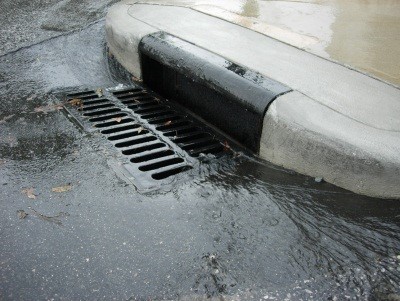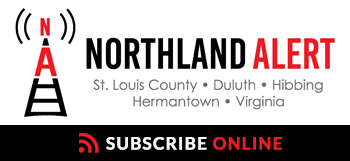Stormwater
Stormwater is rainwater and snowmelt that collects on the ground as a result of rain and snowfall. When this water flows across the surface of the ground it picks up soil and pollutants and carries them to the nearest stream, river, or lake. Stormwater is NOT TREATED at the treatment plant.
Impervious surfaces include, without limitation, roads, parking lots, rooftops, buildings or structures, sidewalks, driveways, and other surfaces which prevent or impede the natural infiltration of stormwater runoff which existed prior to development.

City of Duluth Public Works and Utilities has recently posted a 2025 overview of the Stormwater Pollution Prevention Program, and is asking for review and comment from the public. Any questions or comments can be submitted to Ryan Granlund, Utility Programs Coordinator, at rgranlund@duluthmn.gov or 218-730-4088.
Duluth's Stormwater Utility System consists of:
- 415 miles of pipe,
- over 100 miles of ditches,
- about 3,000 culverts,
- 11,204 catch basins,
- and 5,216 manholes.
Storm drains and catch basins carry stormwater from the streets and parking lots to the nearest waterway. Catch basins are the heavy steel grates located along the curbs, usually near intersections.
The City of Duluth has forty-four named streams within its boundaries, and sixteen of these are designated trout streams. Duluth's streams play an important role in conveying stormwater from the land to the St. Louis River and Lake Superior. They are a natural stormwater system that makes up the community drainage system. City staff works to maintain the streams by clearing brush from inlets and outlets of culverts, removing sediment from storm sewer pipes that lead to the streams, plus working to reduce erosion.
Protecting Duluth's stormwater can be easy. Think of your curb and gutter as lakeshore property- remember that whatever is on the street washes down the storm drains and flows straight into our streams, then to the St. Louis River and Lake Superior. Don't blow your leaves and grass clippings into the street. Sweep up road sand in the spring. Pick up pet droppings. Wash your car on the lawn where the soapy water can soak into the ground, not the driveway where the water will flow into the storm sewer. Don't litter- much of that trash ends up in our lakes and streams. Reduce soil erosion- sediments are usually fine-grained sands, silts, and clays that can cover up coarser sediments and the spaces between rocks and cobbles that provide habitat for aquatic life and suffocate fish eggs. Learn more about them at the Lake Superior Streams website.
Maintaining this system is no easy task. Utility Operations uses hydraulic rodders and high-pressure jetters to flush and clean the storm sewer pipes, along with a small closed-circuit television camera mounted on a tracked crawler to drive down the pipes and inspect for cracks, breaks, leaks and pollution sources. If breaks are detected in the system, Duluth's stormwater construction crew makes the repair. Utility Operations staff includes a team of Utility Resources Specialists who are dedicated to preserving the high quality of water in our area. Their job covers a wide range of duties: erosion control, flow monitoring, Inflow/Infiltration into sanitary sewers, illegal connections, illicit discharges, sump pumps, bypass valves, sedimentation measurement, school presentations, homeowner meetings, and much more. The stormwater utility also has staff in Engineering.
The City of Duluth’s stormwater utility partners with many organizations, both private groups and governmental agencies. Collaborating with others allows us to share resources and save money. By bringing everyone together, a consistent message is created to avoid confusion. Having a wide variety of agencies working together also allows us to share expertise in our specialized areas.
The Regional Stormwater Protection Team (RSPT) was formed in 2002 by 26 regional communities & agencies who came together to provide mutual support, education and outreach regarding protection of their shared Western Lake Superior Watershed. The all-volunteer organization has pooled resources and successfully attracted funding from several granting agencies, which has allowed implementation of a multi-year media campaign, 2005 and 2007 Watershed Festivals, representation at regional events, home shows, and development of numerous presentations and publications. Many member organizations have been recognized as leaders in their protection of water resources, receiving regional, state and national recognition.
The Duluth Urban Watershed Advisory Committee (DUWAC) initially met in 2015 and continues today as a Voluntary Cooperation Organization that encourages management of local streams on a watershed basis. An initial action of the committee was to create a vision statement to help guide the group, which is “Our water resources and associated ecosystems become healthier and more resilient through public engagement and local government collaboration.” This statement will assist in community involvement helping to develop priorities for cooperative watershed management. To formalize the structure of the committee, a memorandum of understanding (MOU) was created and adopted by all member communities in 2018. One of the goals of the Duluth Urban Watershed Advisory Committee is to identify and prioritize projects within and between communities, maximizing efficiency to ensure that communities are getting the biggest impact from their investments. Other benefits of DUWAC are to improve our community’s understanding and knowledge about water resources and to help identify options to update local codes and ordinances that will improve water resources within our watersheds. A secondary goal of the committee is to recognize efficiencies and opportunities to share expertise between its members.
For more information regarding Illicit Discharge Detection and Elimination, please see the following webpage here. To report an illicit discharge please contact 218-730-4130 or submit online.
Please see the Storm Utility Billing Webpage for more information.
Contacts
If you have any questions or concerns about stormwater, or if you would like to review and comment on the City of Duluth's Stormwater Pollution Prevention Plan (SWPPP), please contact the Engineering office at 218-730-5200.
To report stormwater utility issues, please call the Utility Operations office at 218-730-4130 or use the online form.
